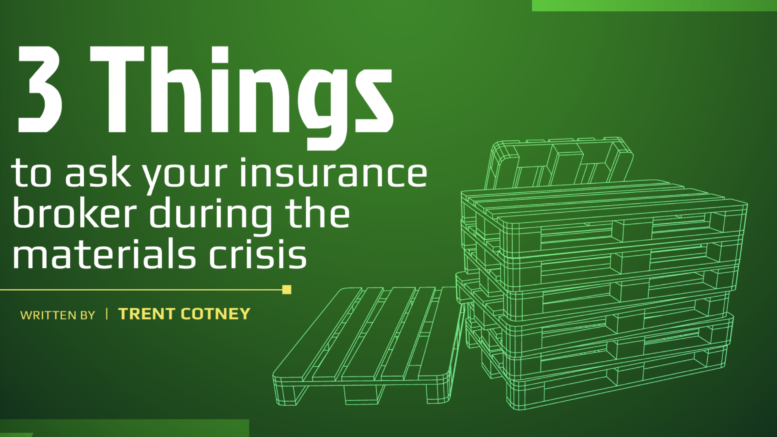The materials crisis is having a global impact and affecting many industries, including construction as well as automotive, technology, and many other industries. Every day I hear from contractors who are facing scheduling issues because supplies are unavailable or delayed. As a result, they are having to renegotiate current contracts or even turn down work. It is a challenging time, and many companies wonder how they will survive it.
There are a number of strategies you can use to weather this storm, including working with your vendors, revising your contracts to accommodate delays, and stockpiling common supplies when they are available. In addition, you should look to your insurance broker as a partner in these trying times and ask the following questions.
1. What Are My Personal Property Limits to Cover Storage?
If you have managed to secure a generous materials supply, that could be a boon for your business. However, you must tackle the question of where to store it and protect it.
If you are storing your supplies on your property, most insurance companies automatically cover contents in a storage unit if the unit is there for a short time. In most cases, coverage would be for 60 or 90 days. If you need to store it for a more extended period, be sure to check with your insurance carrier. Most likely, you will need to provide a list of what you are storing. You may also need to increase property storage limits to ensure you are covered if supplies are damaged or stolen. However, your insurance policy may already cover an on-site unit, especially if it is located very close to your main structure. Your broker can verify that for you.
If you choose to store materials at an off-site location, talk to your broker about that as well. You will probably need to provide the storage facility address, your unit’s square footage, and information about sprinkler systems and security.
In most cases, your property insurance will cover damage from fire, weather, and theft. Some water damage is likely covered, but flooding is probably not, so consider buying flood insurance as well.
2. Does My Policy Include an Inflation Guard or Replacement Cost?
As you know, most property increases in value over time. So, what happens if your insurance policy covers a specific dollar amount, but a year or so later, that is less than what your property is worth? You would be left with a shortfall. To remedy this, your policy might include an inflation guard. This provision allows for your policy limit to increase during the policy term, usually by a certain percentage over a certain time period. The goal is for the policy to cover the actual value of your property, not its value when the policy was enacted, so be sure to ask your broker about that stipulation.
Also, find out if your policy assessed your property by replacement cost or cash value. When you file a claim, replacement cost means that you would be offered the funds to replace the property item with a new item of the same kind. In contrast, with an actual cash value provision, you would receive the replacement cost minus depreciation based on condition and age.
To adequately cover a healthy materials supply, you will likely benefit most from a replacement cost provision. It would allow you to fully replace any stolen or damaged materials, allowing for any increase in value that has accumulated.
3. Will My Policy Cover Expedited Shipping for Required Materials?
Suppose you have a big project starting soon, but fire destroys the materials supply you had earmarked for it. Even if you can replace the materials, can you get them quickly enough to start the project on time? Perhaps. Ask your broker if your insurance policy will cover expedited shipping for materials you require in a hurry.
Expedited shipping ensures that goods will arrive faster than standard freight times. To speed up the process, trucks moving expedited goods rarely stop. Often trucking companies must use two drivers in a single truck to ensure the decreased transit time, and these shipments usually move directly from initial pickup to final delivery. Depending on the amount of material you need to be replaced, paying for expedited shipping could be a hefty expense, so it is important to know upfront if your policy will accommodate such a cost.
Final Thoughts
As with managing every critical issue, good communication is key. If you want to navigate the materials shortage successfully, it is essential that you stay in touch with your suppliers, your crew, and your clients. But you must also keep in close contact with your broker so you understand your level of coverage and protection. That way, you can be confident your insurance policy will benefit you when you need it most.
Author’s note: The information contained in this article is for general educational information only. This information does not constitute legal advice, is not intended to constitute legal advice, nor should it be relied upon as legal advice for your specific factual pattern or situation.
About the author: Trent Cotney is an advocate for the roofing industry, General Counsel of the National Roofing Contractors Association (NRCA) and several other industry associations. For more information, contact the author at (866) 303-5868 or visit www.cotneycl.com.



Be the first to comment on "3 Things to Ask Your Insurance Broker During the Materials Crisis"